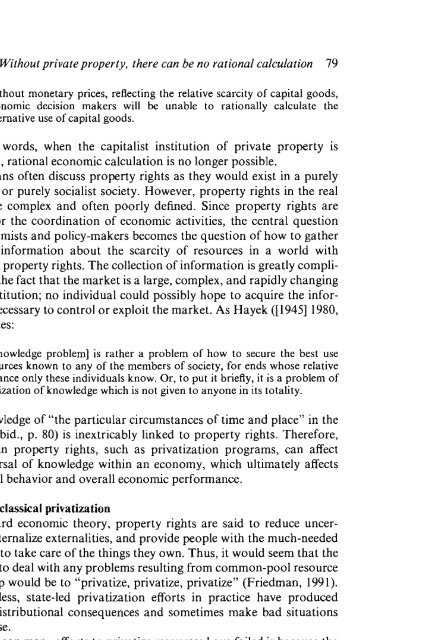Handbook on Contemporary Austrian Economics
Handbook on Contemporary Austrian Economics
Handbook on Contemporary Austrian Economics
Create successful ePaper yourself
Turn your PDF publications into a flip-book with our unique Google optimized e-Paper software.
Without private property, there can be no rati<strong>on</strong>al calculati<strong>on</strong> 79<br />
3. .Without m<strong>on</strong>etary prices, reflecting the relative scarcity of capital goods,<br />
ec<strong>on</strong>omic decisi<strong>on</strong> makers will be unable to rati<strong>on</strong>ally calculate the<br />
alternative use of capital goods.<br />
In other words, when the capitalist instituti<strong>on</strong> of private property is<br />
abolished, rati<strong>on</strong>al ec<strong>on</strong>omic calculati<strong>on</strong> is no l<strong>on</strong>ger possible.<br />
<strong>Austrian</strong>s often discuss property rights as they would exist in a purely<br />
capitalist or purely socialist society. However, property rights in the real<br />
world are complex and often poorly defined. Since property rights are<br />
crucial for the coordinati<strong>on</strong> of ec<strong>on</strong>omic activities, the central questi<strong>on</strong><br />
for ec<strong>on</strong>omists and policy-makers becomes the questi<strong>on</strong> of how to gather<br />
accurate informati<strong>on</strong> about the scarcity of resources in a world with<br />
imperfect property rights. The collecti<strong>on</strong> of informati<strong>on</strong> is greatly complicated<br />
by the fact that the market is a large, complex, and rapidly changing<br />
social instituti<strong>on</strong>; no individual could possibly hope to acquire the informati<strong>on</strong><br />
necessary to c<strong>on</strong>trol or exploit the market. As Hayek ([1945] 1980,<br />
p. 78) notes:<br />
[The knowledge problem] is rather a problem of how to secure the best use<br />
of resources known to any of the members of society, for ends whose relative<br />
importance <strong>on</strong>ly these individuals know. Or, to put it briefly, it is a problem of<br />
the utilizati<strong>on</strong> of knowledge which is not given to any<strong>on</strong>e in its totality.<br />
The knowledge of "the particular circumstances of time and place" in the<br />
market (ibid., p. 80) is inextricably linked to property rights. Therefore,<br />
changes in property rights, such as privatizati<strong>on</strong> programs, can affect<br />
the dispersal of knowledge within an ec<strong>on</strong>omy, which ultimately affects<br />
individual behavior and overall ec<strong>on</strong>omic performance.<br />
6.2 Neoclassical privatizati<strong>on</strong><br />
In standard ec<strong>on</strong>omic theory, property rights are said to reduce uncertainty,<br />
internalize externalities, and provide people with the much-needed<br />
incentive to take care of the things they own. Thus, it would seem that the<br />
best way to deal with any problems resulting from comm<strong>on</strong>-pool resource<br />
ownership would be to "privatize, privatize, privatize" (Friedman, 1991).<br />
Nevertheless, state-led privatizati<strong>on</strong> efforts in practice have produced<br />
uneven distributi<strong>on</strong>al c<strong>on</strong>sequences and sometimes make bad situati<strong>on</strong>s<br />
even worse.<br />
The reas<strong>on</strong> many efforts to privatize resources have failed is because the<br />
policy-makers in charge of the privatizati<strong>on</strong> misunderstand the role property<br />
rights play in communicating market informati<strong>on</strong>. The policy-makers<br />
in charge of privatizati<strong>on</strong> efforts, who are usually trained in neoclassical<br />
ec<strong>on</strong>omics, act as Adam Smith's ([1759] 1982, pp. 233-4) "man of system";

















